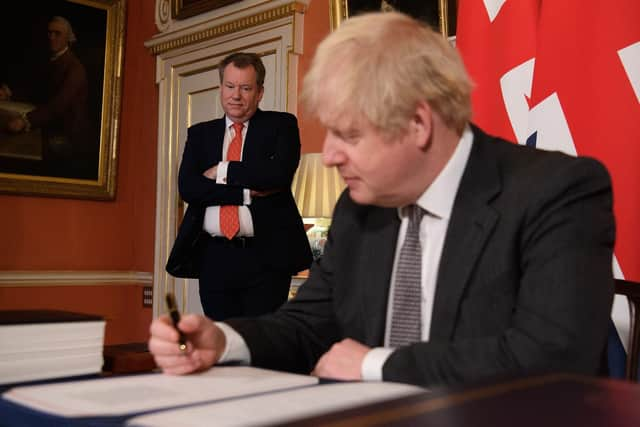Lord Frost calls for end to fracking ban to access '50 years of cheap gas' under Yorkshire
In a letter sent to the Sunday Telegraph, the group argue that the Bowland Shale formation of gas under Yorkshire and Lancashire would be capable of offering “at least 50 years of cheap and sustainable gas”.
But International Environment Minister Lord Goldsmith said 6,000 new wells would be required to replace just half the nation’s imported gas, which chiefly comes from ally Norway rather than Russia.
Advertisement
Hide AdAdvertisement
Hide AdThe shale gas mining ban came into effect in 2019 and energy company Cuadrilla was recently ordered to seal up two of England’s only viable shale gas wells.


Lord Frost said reversing the fracking ban would herald a “British energy renaissance”.
He told the Sunday Telegraph: “If our economy is to boom after Brexit, British industry needs a competitive and reliable source of energy which we hold in our own hands and brings investment into this country. Shale gas production achieves all this and more.
“If we don’t produce it here, as we have seen, all we do is import gas from elsewhere, and push up overall carbon emissions too.
Advertisement
Hide AdAdvertisement
Hide Ad“So let’s reverse the moratorium on shale gas and let a British energy renaissance begin.”
Cuadrilla chief executive Francis Egan hit out at the move to permanently plug and abandon its two horizontal shale wells drilled at the Preston New Road site in Lancashire, claiming domestic shale gas could combat the cost-of-living crisis.
Mr Egan told the same newspaper that “using domestic shale gas should be a no-brainer.”
He added: “Developing and producing this precious resource would create tens of thousands of well-paid jobs and empower local communities in the North. ‘Red Wall’ councils would raise millions of pounds in local taxes, and tax on domestic gas production could generate revenue for the NHS.”
Advertisement
Hide AdAdvertisement
Hide AdBut Lord Goldsmith, the Minister of State for the Pacific and the International Environment, said on Twitter in response: “The argument that fracking will reduce our reliance on Russian gas is wrong. Between just one and three per cent of UK gas comes from Russia. We import mostly from Norway – a friend and ally.
“To replace half the gas we import, we’d likely need around 6,000 new wells, with all the associated industrial equipment & endless movements of trucks ferrying toxic chemicals and wastewater to and from sites. It’s hard to imagine communities across the UK being ok with that.
“It’s hard to overstate just how unpopular fracking is with the British public. The last BEIS attitude tracker showed only 18 per cent support (76 per cent supported onshore wind). People do not want large-scale industrialisation of the British countryside.
“And given the gas would be produced by private firms and sold at the highest price (internationally), there would likely be no measurable impact on UK gas prices anyway.”
Advertisement
Hide AdAdvertisement
Hide AdLord Goldsmith concluded by saying: “We do need gas – it is the cleanest bridge to renewables (I’ve not seen a model that says otherwise). But the UK is not Utah. To have any impact at all, Govt would need to rig the market & go to war with furious communities. On every level the cost would be enormous.”
The controversial process of hydraulic fracturing involves liquid being pumped deep underground at high pressure to fracture shale rock and release gas or oil trapped within it.
Fracking was supported by previous Prime Minister Theresa May who insisted such work would be both safe and financially beneficial to residents living close to planned sites in Yorkshire which had been the subject of mass opposition.
Seven companies had Government licences to explore large parts of Yorkshire to see if fracking was feasible. The technique has not been used in the UK since 2011 after it was deemed to have been the cause of earth tremors in Lancashire.
Advertisement
Hide AdAdvertisement
Hide AdIn November 2019 ahead of the General Election that took place the following month, Boris Johnson placed a moratorium on fracking going ahead in England following a report by the Oil and Gas Authority which found it was not currently possible to accurately predict the probability or magnitude of earthquakes linked to fracking operations.
The Government’s announcement of the pause came with the caveat that it would remain in place “unless and until further evidence is provided that it can be carried out safely here”.
Support The Yorkshire Post and become a subscriber today. Your subscription will help us to continue to bring quality news to the people of Yorkshire. In return, you'll see fewer ads on site, get free access to our app and receive exclusive members-only offers. Click here to subscribe.